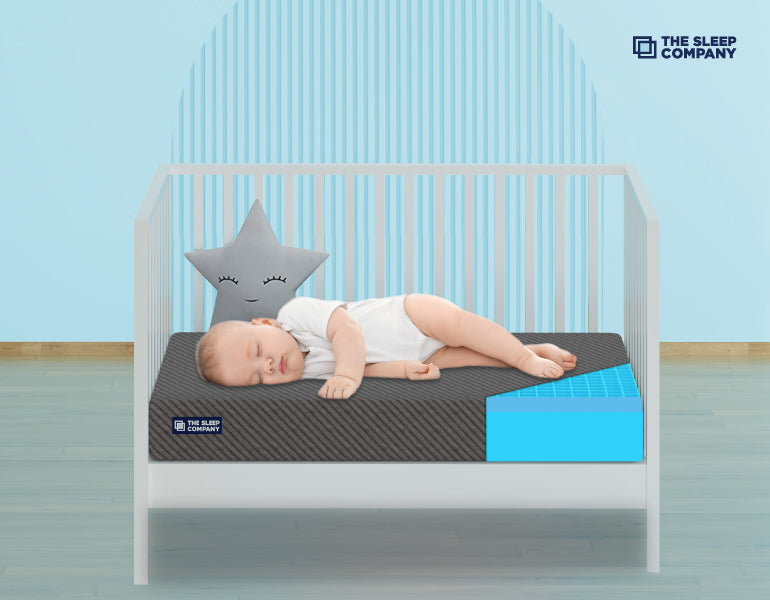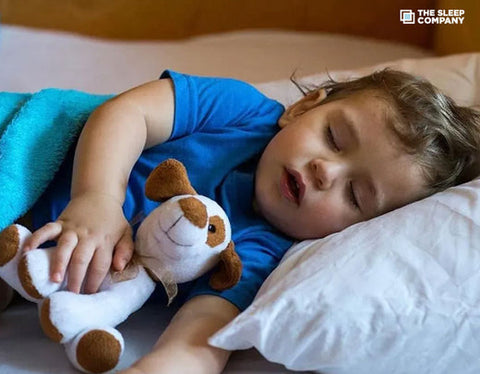My Cart

What is Nap-Why It Is Important For Your Baby

As an adult, we all crave naps, don't we? But did you know nap time is crucial for your little one, especially during the first year? This is because when your little one's brain is developing, the process can feel exhausting on the mind.
Ample rest helps avoid overstimulation and ensures your baby's cognitive development and behavioral health proceed without any hindrance.
In this blog, we walk you through the importance of naps for your kid, what's the ideal nap time and more. So, let's dive in!
What Is A Nap?
A nap is nothing but a short sleep that children take during the day. This is crucial for them as it helps them rest and recharge their energy.
A day nap is also important for young children because they need more sleep than adults to grow and stay healthy. They can last anywhere from 30 minutes to 2 hours but mostly depends on the child's age and needs.
Are Naps Important For Your Baby?
The simple answer is yes, nap time is absolutely necessary. Now many parents worry that a baby nap can interfere with the child's nighttime sleep. But that's not the case. An overtired child can become stressed and irritable. What's more, is that this behavior can also hamper the nighttime sleep. Instead, opt for naps. They can do wonders for your child's mood.
But that's not all. A nap sleep supports brain development. It is also said to help with various cognitive functions like memory and language learning.
Lastly, when you opt for a proper nap duration, you have a happier child. They are well-rested and free of any stressors.
How Much Nap Does Your Baby Need as per Their Age?
Take a look at the below table that walks you through the children sleep time for naps.

Signs That Your Child Needs a Nap
A few clear indications that your little one is craving a baby nap include,
- You notice your child yawning a lot
- They are rubbing their eyes very often
- Your child is getting easily upset or crying a lot
- They become extremely clingy and want to be held
- They seem very tired and are easily irritated
- They react or move slower than usual
So, when you notice any of the above-mentioned signs, it’s usually your child’s way of telling you that they need some nap time. Generally, the ideal time for a nap is the afternoon.
How to Incorporate Naps into My Child's Routine?
Naps seem so easy, don't they? Especially because we adults are overtired and sleep always feels precious. But that's not the case with your little one. So, how to take a nap? Here are a few tips to steer you in the right direction.

1. Make Sure You Maintain a Proper Nap Schedule
Choose a set time each day for naps. Consistency always helps. This way, your child knows when to expect naps. Also, you can use the same trick when it comes to their nighttime sleep as well. This enables them to have a proper sleep schedule right from the start.
2. Create a Calm, Cool, and Cosy Sleep Environment
Make the nap area quiet, dark, and comfortable. These are crucial things that can make one fall asleep faster. Also, make sure the beds, mattress, and bedding are ideal for your little one.
For instance, a kid's mattress is better as they are specially designed for children and supports different sleeping positions as well. Even when it comes to your toddlers or pre-schoolers, a bed designed for them is always ideal.
3. Winding Down Routine before Naps
Have a calming activity before nap time, like reading a book or singing a lullaby. Again, this trick can be borrowed for nighttime sleep. This helps your child get rid of any stressors and simply relax.
4. Don't Change the Routine
Routines are not boring here. Follow the same steps every day before nap time, such as changing into pyjamas or brushing your teeth. This signals your child's mind that it is now time for bed.
5. Watch for Sleep Signs
As mentioned earlier, pay attention to signs that your child is tired. Here, immediately start your nap time routine and help them enjoy their slumber.
6. Be Flexible With Naps
Now no matter how stringent your routine is, the demand for naps can come anytime. Therefore, adjust the nap schedule as needed based on your child's needs and activities.
7. Avoid Late Naps
Try to have naps early enough in the day so they don't interfere with nighttime sleep. The ideal nap time is usually 12 pm to 3 pm. But it can vary from child to child.
At What Age Should I Stop Naps for My Child?
Children stop needing regular naps between the ages of 3 and 5. Some of the signs that show your child doesn't need naps any longer are:
- They find it very difficult to fall asleep at night
- They are organically skipping naps but energy levels don't go down
- Their nap time has drastically gone down, and your child wakes up fresh
- Your child is happy and alert even without naps
Takeaway
While we all love naps after a certain age, it is a crucial factor in young children as naps support growth and development. Just like you have a nighttime routine for sleep, make sure you have one for naps as well. However, make sure your little one indulges in naps early in the afternoon so it doesn't interfere with their sleep.
Another thing you need to help them sleep better is the right mattress. That's why The Sleep Company brings you a Smart Baby Mattress specially designed for your little one. They come with the patented SmartGrid technology that fully supports your child as they snooze.
The amalgamation of SmartGrid Technology with scientific expertise makes sure that every nap aids healthier growth. Some of the other key features of the mattress include,
- 2500+ air channels for breathability
- Firm Feel
- 100% waterproof
- 10 years warranty
- 10 years warranty
Invest in a healthier sleep for your little one today with the Smart Baby Mattress!
FAQs
The amount of sleep a child needs depends on their age. You can take a look at the comprehensive table we bring you in the above article to help you out.
A few signs that show your baby needs a nap are yawning, rubbing their eyes, feeling irritable and looking tired. When you notice the signs, immediately start the bedtime routine and help your child enjoy a proper nap.
A few things you can do to set up a good nap routine for your child include,;
Set a consistent schedule where your child takes naps at the same time every day
Make sure the environment of the room is calm and cosy
Have a soothing pre-nap routine like storytime or singing lullabies
Adjust the routine as per your baby’s needs
A dark room can benefit your child but at the end of the day, see what your child prefers and adjust accordingly.
Naps will not affect your baby’s nighttime sleep only when you manage it well. Therefore, have a set nap length and make sure naps are done early in the afternoon.





























































